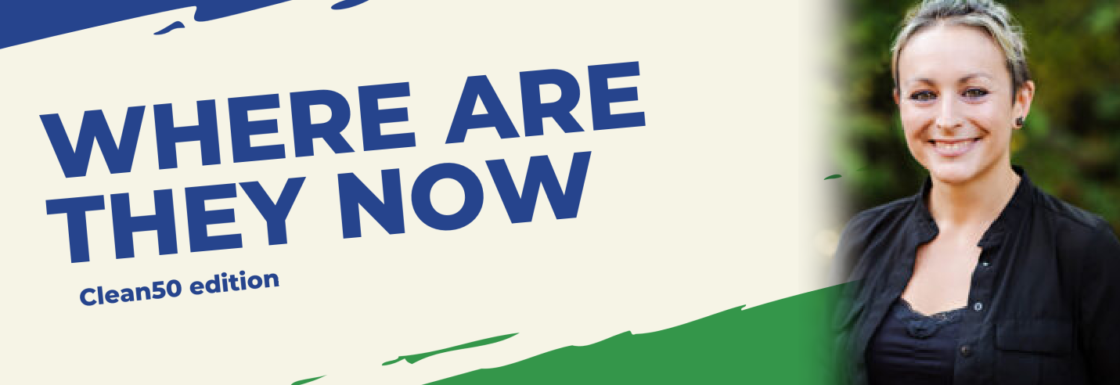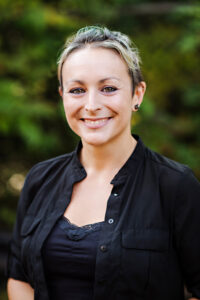Where are they now – Lauren Smith

We love seeing the growth of our past winners and want to share their sustainability journeys with you! We have been following up with our past winners by asking them a series of questions to see how their careers have developed over time.

Lauren Smith – CEO and Founder, PolyGone Technologies
In 2020, Lauren won an emerging leader award for developing the first micro-plastic detection process for consumer beverage manufacturers that is simple and affordable enough to be done at any QA/QC lab. Lauren and her co-founder were providing transparency for consumers and identifying the role that the consumer beverage industry plays in finding a solution. After devising a patent-pending process that combines AI and photography, they raised $100,000 and hired 4 underrepresented co-op students.
Q: Can you describe your current position and company?
A: Social and Ecological Sustainability PhD Candidate at University of Waterloo, School of Environment, Resources and Sustainability, Vanier Scholar 2021-2023. My research combines social psychology, water communication, gender and appraisal of others, and our responses to mortality fears.
Q: How are you contributing to reaching Canada’s climate change and emission goals?
A: My research focuses on water-related decision-making and how we respond to threatening water communications. How we communicate climate change, and to who, matters. If too much ‘doom and gloom’ is used in our climate and/or water communications, we risk pushing those not already involved in climate solutions further away from sustainability goals. I am researching the influence of threatening water communication on decision-making and environmental identity, to determine how to best communicate water risks for both those who already care about the environment, and those who do not. I’m also investigating how these messages influence the appraisal of others, for example, male versus female decision-makers. To create the most effective climate solutions, we need diversity at the decision-making table – yet the majority of decision-makers and executive leaders are uniformly male. Prior research shows that threatening messages push people to prefer others that are like them. If working on climate crises makes current decision-makers prefer the status quo, we risk missing out on more effective climate solutions by not diversifying those involved in climate solutions.
Q: How has being recognized early on in your journey as a Clean50 emerging leader affected your journey?
A: The Clean50 Emerging Leader award communicated to others that I was to be taken seriously and that I understood intricacies of water issues. My work on microplastics with PolyGone, that led to the Clean50 award, required understanding of complex issues and the drive to start a company to address a problem that, at the time, wasn’t widely understood or recognized. The Clean50 award recognized my ability to communicate that problem and present potential solutions for the difficulty of rapid microplastic detection. This recognition highlighted my abilities as a researcher, my curiosity surrounding sustainability problems, and my dedication to solve emerging water crises.
Q: Any upcoming exciting news that you would like to feature? What’s next?
A: Following the Clean50 award in 2019, PolyGone filed an international patent for our rapid microplastic detection methods in early 2020. With the onset of the COVID-19 pandemic, we were unable to access our lab, but in the interim aided our local community by 3D printing and donating face shields to those who were struggling to obtain such protection while the PPE supply chain was stressed. My co-founder and I have used this time to consider how we can have the most positive environmental impact, and have focused on our respective PhD research, mine in environmental/social/existential psychology, and Nicole’s in peatland hydrology in the James Bay Lowland and northern Ontario – an integral carbon storage area threatened by potential Ring of Fire mining development.
I’ve recently submitted a paper outlining how social scientists can use the field of psychology I work with (Terror Management Theory) within their environmental studies. Further research in this area will help us better understand how to communicate climate crises in the most effective manner for positive environmental change. For example, this work will help us understand how to tailor climate messaging to those that are already environmentally minded and to those that are climate deniers, in order to most effectively encourage pro-environmental behaviours. Dr. Sarah Wolfe and I also have an article coming out next year in Water Canada regarding gender representation among Canada’s top water decision-makers, and what that may mean for addressing Canada’s water crises.
Q: Do you have any advice for young adults starting their sustainability careers?
A: Great question. There’s a lot of information out there and a lot of varying understanding of what ‘sustainability’ is. I’d recommend setting a wide net to learn as much as you can and to find what your ‘niche’ is – what interests you most and what are skills do you enjoy using to solve climate problems? Part of this is talking to lots of different types of people. What has been really helpful for me is learning from others in many different sectors, working on sustainability in many different ways. This helped me identify what aspects I was most interested in and how I could best help solve the climate crisis.
Q: Anything else you would like to add?
A: Climate change is such a complex problem, that no matter what your skillset and interests, there’s a way to get involved and help. It’s going to take us all to solve this – whether working on a new technical solution, pressuring for new climate policies, running for office ourselves, or something entirely different!














